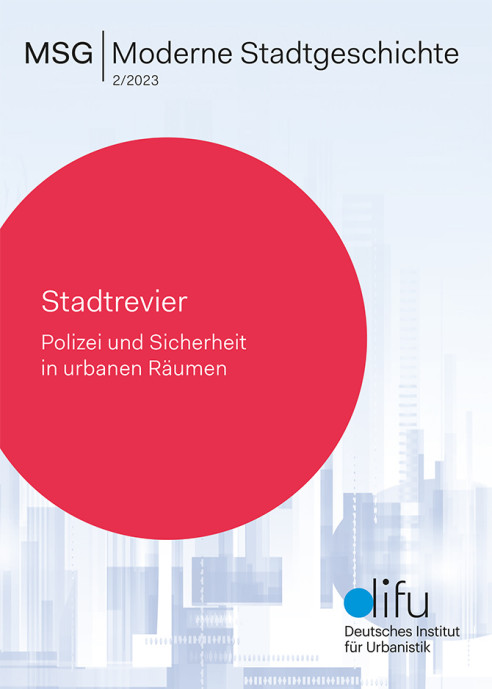Autor/innen
-
Martin Göllnitz
Universität Marburg
-
Sabine Mecking
Universität Marburg
Schlagworte:
Polizei, Sicherheit, Großstadt
Abstract
Long before the 20th century big cities were regarded as spaces of insecurity, in stark contrast with the European tradition of the city as a place of peace, whose “urban air” made people free and guaranteed, at least in general, an absence of violence. The prominent image of the “city as a Moloch” is, however, overdrawn. As early as the 18th century, police reforms began in numerous European cities, in conjunction with a discourse that viewed urban space through the prism of security policy. Since there can be no “objective” or timeless definition of security, this theme issue is based on the assumption that it results from political negotiation processes. In these processes, police forces play an important role as a security actor. The police professionalised their work and became the central expert in safeguarding and indeed defining what counted as security or insecurity urban spaces. In doing so, traditional or newly learned security heuristics served as a framework for interpretation and evaluation. To cope with perceived security problems, the police resorted to security repertoires. These action-related options included patrolling, the use of force, and the application of de-escalation strategies. The foray through more than three centuries demonstrates that both the definition of situations as security-relevant and the use of specific security repertoires are inextricably linked to the police’s authority and power.
Autor/innen-Biografien
Martin Göllnitz, Universität Marburg
Martin Göllnitz, Dr. phil., ist Wissenschaftlicher Mitarbeiter im SFB/TRR 138 „Dynamiken der Sicherheit. Formen der Versicherheitlichung in historischer Perspektive“ und Wissenschaftlicher Assistent an der Professur für Hessische Landesgeschichte der Philipps-Universität Marburg. Neuere Publikationen: Martin Göllnitz, Der Student als Führer? Handlungsmöglichkeiten eines jungakademischen Funktionärskorps am Beispiel der Universität Kiel (1927-1945), Ostfildern 2018; Martin Göllnitz/Sabine Mecking (Hrsg.), Skandal!? Stadtgeschichten aus Marburg im 20. Jahrhundert, Bielefeld 2022; Martin Göllnitz/Nina Gallion/Frederieke M. Schnack (Hrsg.), Regionalgeschichte. Potentiale des historischen Raumbezugs, Göttingen 2021; Martin Göllnitz, The Cultivation of Militant Masculinity: Gender-Specific Dimensions of Violence and the National Socialist Stormtroopers, in: Frank Jacob/Jowan A. Mohammed (Hrsg.), Gender and Protest. On the Historical and Contemporary Interrelation of Two Social Phenomena, Berlin/Boston 2023, S. 181-200; Martin Göllnitz, Homophobie und Revolutionsangst. Die politische Dramaturgie des 30. Juni 1934, in: Oliver Auge/Knut-Hinrik Kollex (Hrsg.), Die große Furcht. Revolution in Kiel - Revolutionsangst in der Geschichte, Kiel/Hamburg 2021, S. 209-234.
mgoellnitz@uni-marburg.de
Sabine Mecking, Universität Marburg
Sabine Mecking, Prof. Dr., ist Professorin für Landesgeschichte an der Philipps-Universität Marburg und Direktorin des außeruniversitären Hessischen Instituts für Landesgeschichte (HIL) in Marburg. Neuere Publikationen: zusammen mit Philipp Erdmann (Hrsg.), Das lange 1933. Nationalsozialistische Machtdurchsetzung in regional vergleichender Perspektive, Themenband der Westfälischen Forschungen 73 (2023); Schläger oder Prügelknabe? Polizeiliches Protestmanagement in Brokdorf, Grohnde und Kalkar in den 1970er Jahren, in: Archiv für Polizeigeschichte 20 (2023), H. 1, S. 12-21; zusammen mit Martin Göllnitz (Hrsg.), Skandal!? Stadtgeschichten aus Marburg im 20. Jahrhundert, Bielefeld 2022; (Hrsg.), Polizei und Protest in der Bundesrepublik Deutschland, Wiesbaden 2020; zusammen mit Frank Kawelovski, Polizei im Wandel. 70 Jahre Polizeiarbeit in Nordrhein-Westfalen, Köln 2019.
sabine.mecking@uni-marburg.de
Veröffentlicht
15.12.2023
Rubrik
Aufsätze und Berichte zum Thema







